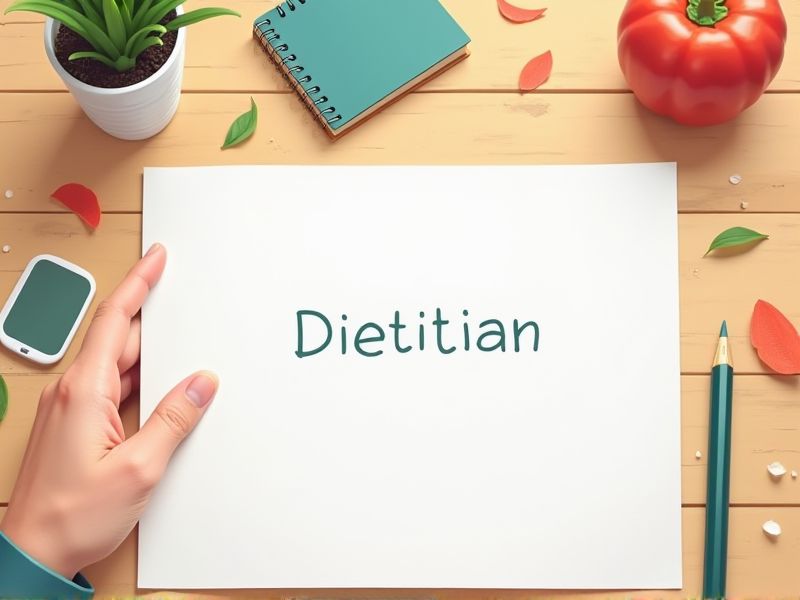
Dietitians play a crucial role in developing nutrition plans and offering dietary advice, impacting health and wellness outcomes. Certifications ensure dietitians possess the necessary expertise and adhere to industry standards, enhancing credibility and client trust. Without these certifications, navigating complex nutritional needs and staying updated with evolving health research would be challenging. Some important certifications required for dietitians include these.
Registered Dietitian Nutritionist (RDN)
The presence of a Registered Dietitian Nutritionist (RDN) ensures patients receive evidence-based dietary advice tailored to individual needs. Training and certification as an RDN guarantee that practitioners adhere to updated nutritional science and medical guidelines. RDNs play a crucial role in managing chronic diseases effectively through personalized nutrition strategies. Their expertise in translating complex dietary research into practical recommendations supports public health and wellness initiatives.
Certified Nutrition Specialist (CNS)
The Certified Nutrition Specialist (CNS) credential is essential for dietitians because it ensures advanced expertise in nutrition science, pivotal for developing effective dietary interventions. The CNS certification signifies a rigorous academic and professional commitment, providing a competitive edge in the ever-evolving nutrition industry. Dietitians with a CNS credential demonstrate an enhanced capacity to translate complex nutritional research into practical, individualized dietary plans. This specialization fosters increased trust and credibility among clients and healthcare providers, leading to better health outcomes.
Board Certified Specialist in Sports Dietetics (CSSD)
Obtaining CSSD certification often leads to enhanced credibility and trust among athletes who seek expert nutrition advice for performance optimization. This specialization requires comprehensive knowledge in sports nutrition, promoting evidence-based dietary strategies that can improve athletic performance and recovery. Employers and sports organizations frequently prefer hiring dietitians with CSSD certification as it signifies a commitment to the highest standards in the field. The certification process involves rigorous education and practice requirements, which ensures that the dietitian stays current with evolving sports nutrition research and guidelines.
Certified Diabetes Educator (CDE)
Healthcare professionals aimed at diabetes management may fall short without specialized guidance. When a dietitian partners with a Certified Diabetes Educator, they access expertise in tailoring nutritional plans to complex diabetic needs. This collaboration enhances patient outcomes by integrating education on medication, glucose monitoring, and lifestyle changes. Given rising diabetes prevalence, having a CDE ensures dietitians can adapt to evolving treatment protocols and technology.
Certified Specialist in Pediatric Nutrition (CSP)
Dietitians working with children often face unique nutritional challenges that require specialized knowledge, which a Certified Specialist in Pediatric Nutrition (CSP) provides. Complex conditions like cystic fibrosis or congenital heart defects necessitate tailored dietary interventions that general nutrition training might not cover. Having a CSP designation enhances credibility and ensures adherence to evidence-based practices in pediatric settings. This specialization supports better health outcomes by employing expert nutritional strategies suited to a younger population's physiological and developmental needs.
Certified Clinical Nutritionist (CCN)
The role of a Certified Clinical Nutritionist (CCN) is necessary for dietitians to provide specialized knowledge in functional nutrition and address complex dietary needs. A CCN offers evidence-based nutritional guidance which ensures a holistic approach to patient care. The training of a CCN in biochemistry and physiology helps in individualizing diet plans tailored to specific health conditions. The expertise of a CCN ensures compliance with healthcare regulations, elevating the standard of dietary practice.
Certified Holistic Nutrition Practitioner (CHNP)
A Certified Holistic Nutrition Practitioner (CHNP) provides a comprehensive understanding of the relationship between diet and overall well-being, which complements a dietitian's focus on nutritional science. As lifestyle-related chronic diseases rise, CHNPs offer insights into personalized nutrition plans that address root causes and promote preventative care. CHNPs incorporate alternative dietary philosophies and stress-reduction techniques, fostering a more integrative approach to health management. Their training emphasizes whole foods and mind-body connections, enhancing the effectiveness of traditional dietary interventions provided by dietitians.
Certified Nutrition Support Clinician (CNSC)
Certified Nutrition Support Clinicians (CNSC) possess specialized knowledge in managing complex nutrition therapies, essential for dietitians handling patients with critical or chronic conditions. Advanced certification enhances credibility, instilling trust among patients and medical teams in the dietitian's expertise. Certification ensures dietitians stay informed about the latest advancements in nutrition support, improving patient care. Rigorous CNSC training prepares dietitians to design individualized nutrition plans, positively impacting patient recovery and health outcomes.
Certified Food Protection Professional (CFPP)
A Certified Food Protection Professional (CFPP) credential ensures a dietitian possesses comprehensive food safety knowledge, crucial for preventing foodborne illnesses. Having a CFPP validates a dietitian's expertise in food handling, preparation, and storage standards, enhancing trust among clients and employers. In healthcare settings, a dietitian with CFPP can better implement safe food practices, directly impacting patient health outcomes. Regulatory compliance with local and national food safety laws becomes more manageable for dietitians who hold this qualification.
Certified Integrative Nutrition Health Coach (CINHC)
A Certified Integrative Nutrition Health Coach (CINHC) can complement a dietitian's work by addressing the behavioral and psychological aspects of eating, which dietitians may not fully cover. Since CINHCs are trained to consider holistic health factors, they can provide guidance on lifestyle changes that support dietary recommendations. As dietitians focus primarily on the nutritional and clinical aspects, a CINHC's broader approach can enhance patient compliance and improve long-term health outcomes. Collaboration between dietitians and CINHCs facilitates a more comprehensive health strategy, ensuring individuals receive well-rounded care.
Summary
You can expect enhanced credibility when a dietitian acquires additional certifications, leading clients to trust their expertise more. This trust often translates into increased client retention and potential referrals. Dietitians with certifications also gain access to specialized knowledge, allowing them to offer a broader range of services. As a result, their career opportunities and satisfaction levels may improve significantly.
